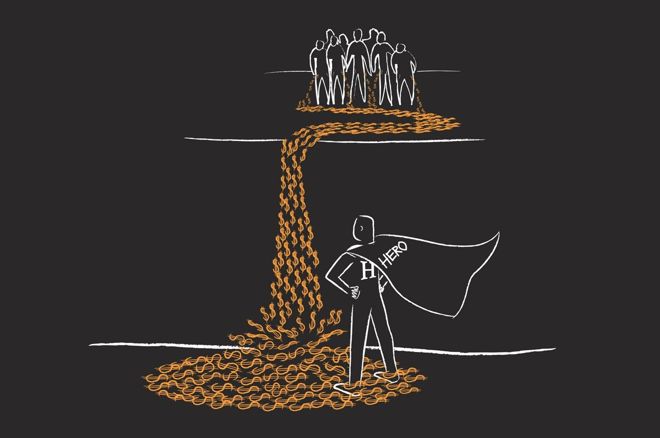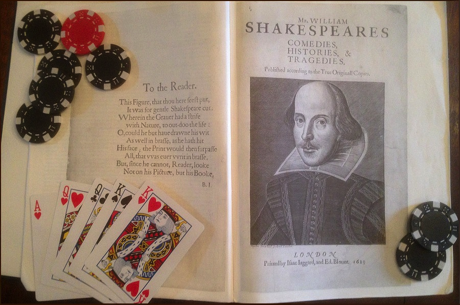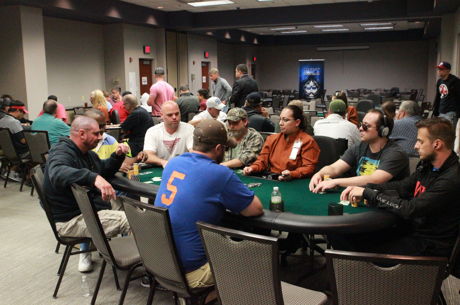Tommy Angelo Presents: Reciprocality -- The Cause of Profit at Poker

In this long-form feature, poker author and coach Tommy Angelo (Elements of Poker, A Rubber Band Story and Other Tales) presents his concept of "reciprocality" in poker and its applications to information gathering, understanding the importance of position, managing bankroll, learning how to quit, handling tilt, and betting.
Before anything flows, there must be a difference. Between different elevations, water flows. Between different pressures, air flows. Between different poker players, money flows.
In the world of reciprocality, it's not what you do that matters most, and it's not what they do. It's both. Reciprocality is any difference between you and your opponents that affects your bottom line. Reciprocality says that when you and your opponents would do the same thing in a given situation, no money moves, and when you do something different, it does.
You can mine for reciprocal gold anywhere in the poker universe. Pick a topic, any topic. It can be as general as "food selection" or as specific as "ace-king in the big blind at limit hold'em." You dig for gold by looking for things that you could do differently in the future, things that will create or increase advantageous differences between you and your opponents, and thereby cause theoretical money to flow from them to you.
Theoretical money doesn't spend, but it does inspire. I remember when I first heard about it under the label Expected Value or EV. I learned that each wager has two results. There's the expected result, based on analysis, and the actual result, based on events.
I was immediately and appropriately obsessed with theoretical money. All I wanted to know was my score. And I mean I wanted to know it now, as in, right after the hand. But I had no idea how to determine the EV of a street, let alone a whole hand. Without realizing it at the time, I borrowed from my prior life as a tournament bridge player �� where my score was entirely dependent on the scores of others �� and I came up with a way to analyze a hand of poker that satisfied my need.
After a hand was over, I'd trade places with my opponent. I'd give him my hole cards and my position, and I'd take his, and I'd do a reciprocal analysis. I would imagine how the play of the hand might have gone in the reversed scenario. Then I'd take the imaginary result and I'd compare it to what actually happened, and I'd get a sense of who really won the hand, in theory.
Sometimes I could not figure it out with much accuracy. But sometimes I could, especially if the hand had few variables, and few decisions, and was against familiar opponents.
Let's say I'm playing limit hold'em and I get pocket kings and Joe gets pocket aces. We play the hand, and Joe wins $100 from me. Right away I'd pretend it had been the other way around, me with the aces, and Joe with the kings. I'd play the streets out and I'd think through the most likely lines and I'd take the resulting probability wave and put a number to it.
In this example, let's say I determined that had I had the pocket aces, I would have won $80. The equation would go like this: Joe won $100 in reality, and I won $80 in reversed make-believe, so my final score on the hand is -$20.
You can apply this method of review to any single street or group of streets.
Let's hold on to that way of thinking and take a look at starting hands in hold'em. In reality, as we all know, the least profitable starting hand is 7x2x, and the most profitable hand is pocket aces. In reciprocality, the least profitable hand is also 7x2x, but not because 7x2xis the worst hand. 7x2x is the least profitable hand because it is the most similarly played hand.
And the most profitable hand is?
Well, it's definitely not AxAx. Sure, there is variation in how to play pocket aces, but there's no doubt that it gets played. The hands that generate the biggest swings, reciprocally speaking, are the hands that fall between middling and good. More on that later on.
So far, I have been answering the question, "What is reciprocality?" In the rest of this article, I will answer the questions "Where do we find it, and how do we cash it in?" by examining reciprocality as it applies to information, position, bankroll, quitting, tilt, and betting. Bring your pick and pan. We'll be mining for gold.
Information Reciprocality
"My secret is I keep secrets."
I play poker on a need to know basis. I need to know the thoughts my opponents are thinking. I need to know the feelings they are feeling. And I need to know the cards they are playing. Meanwhile, I need them to know as little as possible about me. I call this relationship the information war.
The information war is fought on two fronts �� sending and receiving. To win the war, send less information than they send, while receiving more information than they receive. By controlling those differences, you control information flow. That's where to mine for reciprocal gold.
On the internet, the information war is fought on a vast landscape made of statistics software, timing tells, chat boxes, forums, and more. In live poker, there's sights and sounds and smells and tells and it's like an eternal orgy of information exchange. The rest of this section is about information reciprocality in live poker.
Muscles
Think of the human body as a communication device that uses muscles to broadcast information. It is not always obvious who is in charge of operating the muscles. Sometimes we are, and sometimes they are. The more control we can retain over our muscles, the more control we have over information reciprocality.
Face
Humans have twice as many facial muscles as any other animals. The favored explanation is that at some point in the past, increases in facial musculature made our ancestors better than their neighbors at silent communication. The better communicators had an advantage at surviving, and at getting laid, and that's a genetic jackpot. So anytime a mutated gene gave mother nature a choice on this matter, more muscles in the face were naturally selected.
Now, many generations and mutations later, we've got these 40 muscles in our face, all wired up to send subtle silent signals, and we can't unplug them. All we can do is try to talk them into keeping quiet when we need them to, for the sake of the team. During a poker hand, your heart and brain can be saying "Holy Crap!" and then, just as your face is about to say the same thing, your brain will whisper urgently to your face, "Wait! Shhh! Don't move a muscle!"
And when that happens, we see the poker face. The poker face is an instinctive reaction to situations in which the brain tells the body to stop sending information. Reciprocal gold goes to whoever is better at acting instinctively on purpose.
Hands
For the game to be played, chips and cards must move, and human hands must move them. And where there is motion, there is information. Sometimes a little hitch in the hands will tell me something. Sometimes it'll be the way they handle their chips, sometimes it'll be the way they handle their cards, sometimes it'll be the way they check, sometimes it'll be almost nothing, but there's always something.
But the hand movement I get the most information from, by far, is the one where an opponent shows cards when he didn't have to.
Mouth
Here we have a collection of muscles and parts that send information using not only expressions, but also sounds. And not just any old sounds. Words. Sentences. Information of the highest grade. This comes as great news for the reciprocality miner as there are no rules that require the muscles of the mouth to move while playing poker. You have the right to remain silent.
My Teachers
I cannot tell you that quieter is universally more profitable than louder. I cannot tell you that stillness always beats motion. I cannot tell you that less is always more. But I can tell you a story.
I used to shuffle chips until my hands got sore. My legs pulsed so much that my shoes had predictable wear patterns like a poorly aligned car. I have embedded myself at one casino for months or years at a time and talked so much at the table that I was a welcoming committee, table captain, and waitress translator all in one. And with all that movement, and all that talking, I was still able to support my food and rent habit from my poker winnings because I was still way, way ahead of my opponents in the information war, because of what I didn't do, and didn't say, and when.
I didn't show hands. I didn't talk about hands. I concealed elation and disappointment. When it came to information, I was wide open about everything, except the poker game. I learned to play that way because whenever I went to Vegas in the early years, I ran into two kinds of players: the ones I was afraid of and the ones I wasn't. Naturally I paid most attention to the players I feared most. The conspicuous thing they all had in common was this uncanny way of looking like they didn't give a shit. And it scared the shit out of me.
So I copied them and I learned their skills. And the more I did what they did, the more I realized that what I had learned from my teachers was how to play poker between hands. I call it�� sixth street.
Sixth Street
Sixth street starts when the betting stops. Sixth street is when players relax, which is why it pays not to. Reciprocality.
Sixth street is when statues become fountains. While playing the turn and river, the players are stoic, doing their best to give up as little information as possible. And then, as soon as the betting stops, their parts start moving, broadcasting information about their thoughts, their feelings, and their cards. Sixth street is when players let their guard down, as if all of a sudden it's safe to reveal classified secrets to the enemy. It's like they don't even know the war is still going on.
In the stream of information, sixth street is a reliable place to pan for gold.
Mum Poker
A military arms race results in bigger bombs and thicker bunkers. A zoological arms race results in exquisitely camouflaged prey, and predators who can see them anyway. The information war at poker has an arms race, and if one were to take it to its natural extreme �� which I have �� one would play a style of poker I call "mum poker" �� which I do.
On the outside, mum poker is the traditional poker face, extended to the entire body, and maintained through sixth street. On the inside, mum poker is no complaining, no blaming, no regretting. Mum poker is stillness. Mum poker is readiness. If you wanted to go all the way with it, you could think of mum poker as being like absolute zero, the cessation of motion. It is knowable in theory, and forever approachable, yet unattainable.
Or you could just think of it as sit up and shut up.
Today, when I am playing purely for profit, I play mum poker. I wear a baseball cap, no sunglasses, and no lettering. I rarely make eye contact. I do not speak unless spoken to, and even then, I do not react to questions or comments about poker. I have found that the less information I send, the more I focus on the game. And when I am focused on the game, I send less information. With mum poker, I fight for reciprocal gold on both fronts of the information war simultaneously.
Position Reciprocality
"The first shall be last and the last shall be first." ~Jesus
Think of every hand of poker. Think of the enormous number of hands played on the internet, and then add to that every hand played in home games and casinos. Now think of that sum total of all hands, broken down to street by street. All those streets. Millions, billions, whateverillions, it's a lot. Now consider this. Every one of those streets has this in common: someone goes first, and someone goes last.
I agree with everyone who thinks that acting last is better than acting first. But we have to slow down here because this is delicate. Position reciprocality is not the difference between first and last. It's the difference between firsts and lasts. When seen through the lens of reciprocality, positional advantage does not belong to the player who acts last. It belongs to the player who acts last most often.
The advantage of acting last exists during every round of betting. It's always there, at every moment, like home field advantage during a football game. In pro football, during the regular season, to keep everything fair, each team plays half their games at home and half on the road. The rules do not allow a team to create a home-game/away-game reciprocal advantage simply by folding their away games. But at poker, we are allowed to do exactly that. We can fold our "away games," our bad positions, and thereby act last more often than we act first, and thereby create an advantage.
Bankroll Reciprocality
There's your net worth, and after that it's all just accounting. You can say you have a poker bankroll, but really what you have is an imaginary wall between some of your money and the rest of it.
Behind your main poker bankroll wall, there are two other walls on wheels that you construct and maneuver. There's the money you partition off and put on the table to bet with. That's one bankroll. And then there's whatever other funds that are immediately available to you while you are playing, such as the money in your pocket, or maybe even the money in your buddy's pocket. Wherever it is, if it's money that is not on the table, and you can get to it without losing your seat, that's another bankroll. So all together, you have three separate bankrolls when you play. That means you have three ways to run out of money. You can go table broke, pocket broke, and broke broke.
Let me ask you something. Do you play your best game when you are running out of money?
I sure don't. The less concerned I am about funding, the better I play. And I believe the same is true for my opponents. So really, all I have to do is partition my money better than they do, and I make money. Reciprocality.
Quitting Reciprocality
"Walking away is easy. The hard part is standing up." ~me
I have always had very strict policies when it comes to quitting, even when I first started playing poker. Back then I had two main quitting rules that I never broke. I would always quit if I were out of money and nobody would lend me any, and I would always quit if everybody else did.
Eventually I quit all that stuff. I quit running out of money, and I quit being the last guy to quit. Nowadays I think of quitting as a skill set unto itself, with branching subsets of skills for each type of quitting situation. There's knowing how to quit at limit games, and there's knowing how to quit at no-limit. There's knowing how to quit when you have a curfew, and when you don't. There's being able to quit when you're ahead, and when you're stuck. There's quitting when you feel good, and for when that doesn't happen, you need to know how to quit when you feel bad. There are many ways to outquit your opponents.
One thing about tournaments is nobody ever quits. That decision is done for you, or rather, to you. The good news is, it is impossible to make a bad quitting decision in a tournament. The bad news is, your opponents can't screw it up either, which means there is no reciprocal gold to be found in tournaments by the superior quitter.
By one way of looking at it, I have made tens of thousands of terrible quitting decisions. Times when everything was wrong. When I was tired. And tilted. And the game was bad. But I'd play on. I'm talking situations where a panel of quitting experts would unanimously decree: "You are severely injured and you are bleeding all over the table. Quit. Quit now."
But I wouldn't. I'd take the next hand. And that'd be one bad quitting decision. After that hand, I'd have the option to quit, but no, I'd take another hand �� I'd make another quitting mistake. That's two quitting mistakes in four minutes. And I had just begun to not quit.
In time, my blood started to clot, and I got a little bit better at quitting, and then a little more better, and then one day I realized that every session of cash-game poker I ever play will end on a quit, so I really should continue forever to work on getting better at quitting, and a few years later I realized that if I wanted to quit well every session, then I'd have to be sharp at the very end of every session, since that's always when the quitting happens, and a few years after that I realized that no action is an island, that everyone else's sessions always end on a quit too, and that the real reason there is money to be made by quitting well is because sometimes my opponents don't. Reciprocality.
Tilt Reciprocality
"To win at poker, you have to be very good at losing." ~me
During the first few years of my poker-playing career, I played almost entirely in home games that were almost entirely loose and reckless. All I had to do to win was play tight, which I had learned how to do. The trouble was, I had also learned how to tilt.
I was a great tilter. I knew all the different kinds. I could do steaming tilt, simmering tilt, too loose tilt, too tight tilt, too aggressive tilt, too passive tilt, playing too high tilt, playing too long tilt, playing too tired tilt, entitlement tilt, annoyed tilt, injustice tilt, frustration tilt, sloppy tilt, revenge tilt, underfunded tilt, overfunded tilt, shame tilt, distracted tilt, scared tilt, envy tilt, this-is-the-worst-pizza-I've-ever-had tilt, I-just-got-showed-a-bluff tilt, and of course, the classics: I-gotta-get-even tilt, and I-only-have-so-much-time-to-lose-this-money tilt, also known as demolition tilt.
I'd tilt, and I'd look back on my tiltings, and I started seeing cycles, and then cycles within the cycles, and before long, I started to see my entire poker future as a ceaseless fluctuation between tight and tilt. I figured if I ever went broke at poker, it wouldn't be because my best wasn't good enough to keep me afloat. It'd be because my worst was bad enough to sink me.
A big day in my career was the day I realized that tomorrow I would still be a tilter. That there would be no quick fix. That any headway I made would be gradual. I realized that if I could somehow put progressively longer periods of time between my tiltings, and if I could somehow have them be progressively not quite as bad as the last time, then I'd have a chance to get some wind under my wings, and when I did, I'd soar indefinitely. Less often, less severe. Less often, less severe. That's what I kept telling myself.
Since then I've played thirty thousand hours of poker, and in that time I have gathered myself, and my thoughts...
On Tilt
Tilt has many causes and kinds, but it has only one effect. It makes us play bad. It makes us do things we wouldn't do if we were at our very best. And that's how I want to define it, exactly like that. Tilt is any deviation from your A-game and your A-mindset, however slight or fleeting.
There are two reasons to define tilt in this way. One is standardization. All A-games are identical. Anyone who is playing his A-game is making the best decisions he knows how, and his mind is as right as it ever is. That's what A-game is. It's our best. And we all have it. So by defining tilt from the top down, we can draw a line for any player that cleanly divides his tilt from his non-tilt.
The other reason is that we aren't just playing with words here. We are using them as shovels to dig for gold. And by using the word tilt to focus on our best, instead of our worst, we hit a lode: Tilt is non A-game. Tilt is anything less than your utmost. Tilt is suboptimalness. Defining tilt in this way, everyone tilts. It's just a matter of how often, how long, and how bad.
And so we arrive at the three dimensions of tilt: frequency, duration, and depth. How often do you deviate from your A-game? How long does it last? And how far below your A-game do you go? Revisit those questions.
Tilt is all about you. If you think you should have quit sooner, or if you think you should have played at different stakes, or if you think you made a bad call, then you tilted. Only you really know when you knew better.
Tilt reciprocality is your slippage matched up against everybody else's. Tilt reciprocality recognizes that any reduction, however small, in the frequencies, durations, and depths of your own tiltings will always have the effect of favorably widening the gap between your tilt and theirs, thereby earning immediate reciprocal advantage. To make money from tilt, you don't need to be tiltless. But you do have to tilt less.
Betting Reciprocality
"Seventy-five percent of all poker players think they play better than the other seventy-five percent." ~me
Betting reciprocality is the difference between your betting decisions �� raise, bet, call, check, and fold �� and theirs. To calculate betting reciprocality, compare what you did (or would have done) to what your opponent would have done (or did) if you traded places. I call this reciprocal analysis.
Preflop Betting Reciprocality
I am going to list the ways that two players can start a hand, starting with the least consequential, and moving toward the differences that make the most difference. If, in a given preflop situation:
- Two players would both fold, then no reciprocal money moves between them on that hand. No-brainers are no-gainers.
- Two players would both call before the flop, or if they would both raise, then still no money moves between them before the flop. There might be reciprocal motion on the hand after the flop, depending on how differently they would play it.
- One player calls before the flop when the other would raise. Here we have reciprocal motion before the flop, with potential for more after the flop.
So far, either both players saw the flop, or both players didn't. None of those scenarios create as much reciprocality as this one:
- One player folds before the flop when the other player would call or raise.
Postflop Betting Reciprocality
After the flop, no matter how anyone got there, we can focus the reciprocal lens on any single bet, or street, or combination of streets, and do a reciprocal analysis. For example, it's on the river playing limit hold'em and you have the best hand. You bet and your opponent calls. If the situation were reversed, and your opponent bet the river, would you have called? If the answer is no, then you just won one bet. If the answer is yes, then you broke even.
At no-limit hold'em, the nature of all-in-ness narrows the reciprocal focus in a specific, recurring way. Let's say Joe and Moe both hit the flop. At some point in the hand, they get all-in. In reality, Joe busts Moe. In reciprocality, the main question is, would Moe have busted Joe? If the answer is yes, then the hand is a tie. If the answer is no, then Joe wins the hand by however much money he has in front of him at the end of the hand in the imagined reality.
Simple enough? Only on paper. Because now we dive into the place where the theory thickens��
The Gray Area
So far, all the reciprocalities have been black and white. For example, when tilt reciprocality causes money to flow, we know for certain which way it is flowing. The same is true with bankroll reciprocality, quitting reciprocality, and all the others. Not so with betting reciprocality. This is where black blends with white and leaves us in the gray. This is where uncertainty is certain. And thank goodness for that! It's what makes our game so magnificently messy.

Think back to the very first hands of poker you ever played. Your gray area was almost everywhere, and your A-game stank. With every hand, with every round of betting, with every sixth street discussion, you gained significant experience and understanding. Your A-game improved at the same rapid pace that your gray area �� your uncertainty �� shrank.
As times passed, your rate of change slowed. Your A-game improved more slowly, and your gray area shrank more slowly. Yet no matter how good you get, you will always have a gray area. The gray is not part of you. It's part of the game.
Here are two examples of black and white decisions:
- Playing limit hold'em, in a full game, you are under the gun with 7x2x-offsuit. Should you raise, call, or fold?
- Playing any poker game, it's on the river, you are heads-up, and you have the nuts. Your opponent checks. Should you check or bet?
As we move into the gray, the theoretical expectations of our options become more balanced. A decision might make us a 60-40 favorite, for example. Moving into the central gray region, we arrive at those decisions for which the expected outcome is 50-50 or nearly so. These are the decisions of little or no theoretical consequence, the decisions where each option is as good as the other. These are the decisions that matter least.
Also in the central gray �� the land of closest decisions �� we can expect disagreement to go up over which decisions are best. We can expect intelligent, elaborate debates with both sides insisting theirs is the right side. We can also expect to debate with ourselves and to second guess ourselves. In the central gray is where we are most likely to torture ourselves with the question: Did I get it right?
And that's why I say: The decisions that trouble us most are the ones that matter least.
Let's say you face a close betting decision, and afterwards, you want a definite answer. You want to know, one way or the other, if your play was right or wrong.
STOP!
That's a mistake. Just by thinking like that, about right and wrong, you are making a mistake. If you play a hand and you face a close decision and then you write about it or talk about it, I think that's great �� seriously. Or if you talk about hands other people played, same thing. All good. But be careful. Don't fall into the gray area's trap. Don't burn up valuable energy and waste precious sanity. Don't assume that just because you have an answer, and just because someone else has a different answer, that one of you is right and the other is wrong.
Let's say I'm on the button and everyone folds around to me. Depending on my cards, and my opponents, and other parameters, it might be obvious to me what the best choice is, or it might not be obvious at all. Should I assume that there is always a right answer? And even if there is a right answer, should I assume that I can always know what that answer is? I believe the answers to those questions are no and no.
Another example. It's on the turn, playing limit hold'em. There are three players in the pot. I am second to act. The first guy bets out. Should I raise? Should I call? Should I fold?
Okay, I'll tell you more. I've got top pair. The guy who bet out might be on a draw, or he might have a monster. I can't really tell. The guy behind me might be really weak, maybe drawing thin against my hand. But he's acting so weak that maybe he's strong and he's about to raise it. Or maybe he is on a draw and I need to raise to either get him out or make him pay the maximum price. But the guy who bet out might have me beat. He might even have me drawing dead. If I raise, I open it up for him to reraise. Hmmm. Tough one. Should I raise? Should I call? Should I fold?
I believe it is correct to believe in unknowableness. Analyze, evaluate, ponder, and then let it be. Resist the gray area's mind-snaring entrapments. When you examine a betting decision, yours or someone else's, at the table or away, on your own or with others, remind yourself that debates point to close decisions, and that close decisions matter least, and that the answer is sometimes unknowable.
And by not dwelling on close decisions, you will enjoy reciprocal gains in energy conservation and sanity preservation when you play against those who do.
The Lens
Reciprocality is not a theory about how to win at poker. It's a way of seeing. When I look through the lens of reciprocality, I see every incremental improvement and every deterioration, of mine, and my opponents, at betting, and everything else, as being immediately rewarded or punished in the currency of reciprocal gold.
But then, like I said, that's how I see it. Now the lens is yours. Point it where you will, focus it as you please, and make your own discoveries.

To join Tommy��s mailing list and receive updates on his upcoming third book, Painless Poker, plus random musings and advice, click here immediately.









